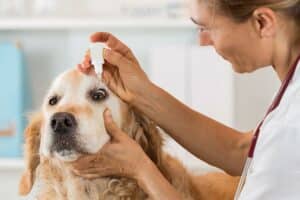Índice do Conteúdo
You may have noticed your dog chewing and licking their paws. Why do they do this? As with other dog behaviors, there can be several causes, including injuries, skin problems, allergies to canine environments, parasites, or food, and boredom or anxiety.
Occasional paw licking is normal for dogs as a part of their self-grooming process, especially when they come inside after walking on dirty or sandy ground. But if your dog frequently and intensely licks their paws, you can assume that something is wrong.
Injuries
The first step to take, especially if the licking begins very suddenly and is focused on one paw, is to examine the paws. You’ll need to check to make certain there is not an injury such as a cut, torn nail, growth, or perhaps a stone, thorn, or ice ball stuck between the pads. Look closely at the nails, between the toes and pads, and at the tops of the feet.
Your dog may have irritated their paw by stepping on something sharp, walking on salted or hot sidewalks, being stung by a bee, or getting a blister. Some of these problems can be relieved by a simple first-aid treatment, while others might require treatment by a veterinarian.
Dermatitis
If the paw pads and feet appear normal, the licking could be due to a skin condition (dermatitis), which often is the result of bacterial problems, allergies, or food sensitivities. Your dog could develop dermatitis by being allergic to chemicals used in your yard, products meant to deice your driveway, or certain types of grass or weeds. Keeping a bowl of water and a towel near the door to gently clean off the paws when you come inside could help.

Parasites
Parasite infections (such as fleas or mange) can cause the paws to be very itchy. Your veterinarian can recommend treatments to eliminate the parasites, which should relieve the itching.
Food Allergies
Food allergies are known to cause itchy paws, and these types of allergies are difficult to pinpoint. Your vet may suggest a special diet or elimination of certain ingredients in your dog’s food to try to address the problem.
Pain
Finally, a dog that is experiencing pain due to arthritis or other foot or leg conditions may lick their paws. Even if the pain is somewhere else in their body, some dogs will try to deal with it by licking a front paw continuously. This requires diagnosis and treatment by a veterinarian.
Behavioral Issues
If you and your veterinarian have ruled out all of the above problems, then your dog may be suffering from boredom or a behavioral problem such as anxiety. Again, this is difficult to diagnose, but there are some steps you can take to help. Some dogs develop compulsive behaviors, which include paw licking.
To deal with boredom, try taking your dog for more walks or runs. Increase playtime with you and with other dogs to use up more mental and physical energy. Give your pet puzzle toys or safe chew toys to take their focus away from his paws.

If you think anxiety, such as fear of noises or separation anxiety, may be causing them to lick their paws, there are a number of ways you can attempt to relieve the anxiety, including calming treats. A good animal behaviorist can suggest a variety of options to try.
Secondary Infections
It’s important to recognize that licking behavior can be indicative of a health problem or may become harmful to the dog. You should work with your veterinarian to determine the cause and find an appropriate solution. Don’t wait too long to do this, because the moisture of constant foot licking can cause a secondary bacterial or yeast infection – causing even more itching, redness, swelling, and licking.
Meanwhile, depending on the underlying cause of the problem, the veterinarian may relieve your dog’s itching by prescribing topical anti-itch sprays, steroids to reduce inflammation, antibiotics for a bacterial infection, or antifungals for yeast infections. The sooner you can address the problem and illuminate the cause, the better.








